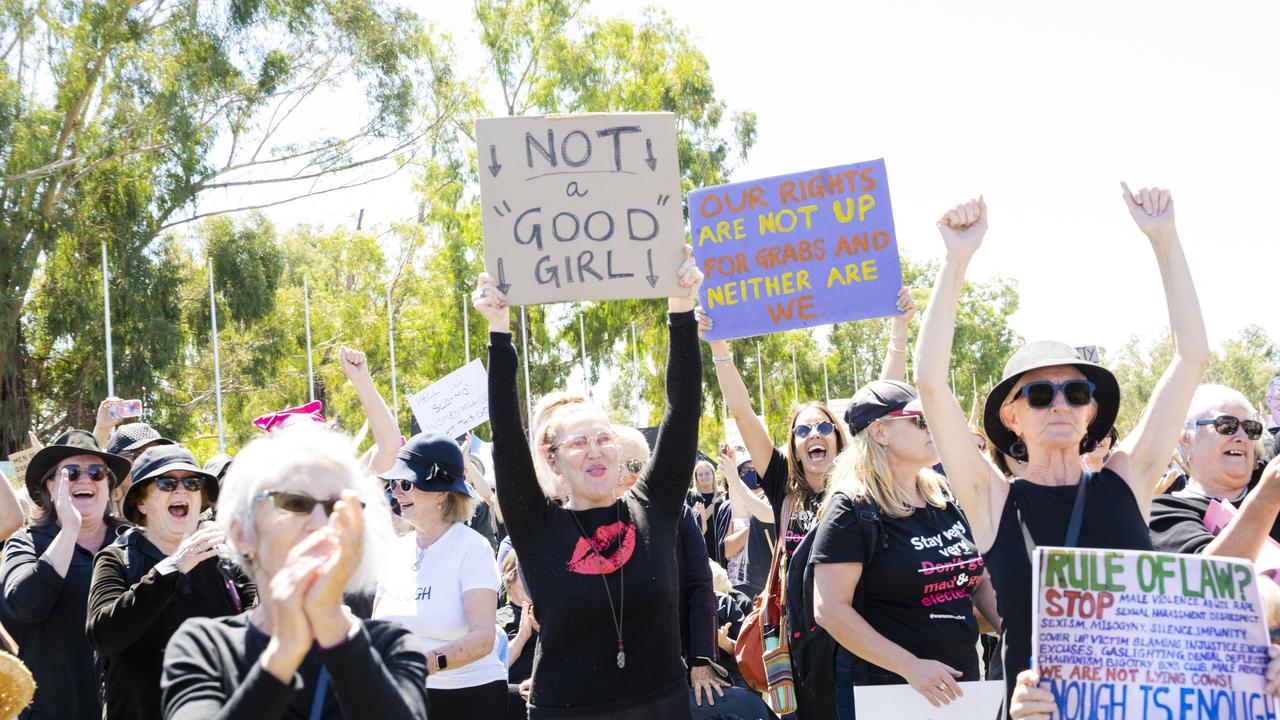Could this point confuse the March 4 Justice objective?
Thousands of Australians protested as part of the March 4 Justice rallies. But Joe Hildebrand says one point could confuse its objective.
The forces of progress are always at their best when they reach down and try to lift people up. They are immediately corrupted when they reach up and try to tear people down.
Consider the great seismic movements of enlightenment and emancipation throughout history: The campaign by William Wilberforce to abolish slavery. The campaign by Australian workers for an eight-hour day. The campaign by Martin Luther King for black civil rights. The campaign by Mahatma Gandhi to liberate India.
All of them saw suffering on a mass scale and devoted themselves to alleviating it. All of them ultimately prevailed.
This is the polar opposite of the ideologically driven and hate-fuelled power grabs of zealots like Lenin, Robespierre or Mao who saw progress only through the prism of an enemy to be destroyed and replaced with dictatorship and death.
We are seeing today this story play out on a much more intimate scale in Australia – the tension between those of goodwill who are genuinely seeking change for the greatest number, and political opportunists attempting to use the suffering of others as an ideological weapon.
I wrote some time ago about the profound danger of activists linking the criminal case against Cardinal George Pell too closely to the broader issue of institutional child sex abuse.
The focus should always have been on justice and restitution for all the victims involved rather than the crucifixion of an ideological foe.
Instead the opposite was the case. It was clear that in the eyes of many activists the purpose and indeed crowning glory of the royal commission was Pell’s conviction.
As it turned out Pell was unanimously and emphatically acquitted by the full bench of the High Court.
Pell’s conviction and subsequent acquittal made international headlines and were accompanied by deafening howls. Meanwhile various religious and other institutions were attempting to worm their way out of the government’s compensation scheme with almost no attention or scrutiny.
Today there is a similar focus on the treatment of women in politics, especially vulnerable female staffers, at the hands of more powerful men.
Yet this debate has now been thoroughly confused by historic rape allegations against Attorney-General Christian Porter, which he strenuously denies and is now taking defamation action over.
RELATED: PM asks Porter to relinquish duties

There is now the inescapable coupling in the public mind of widespread complaints about assault and harassment by women in politics with the specific allegations against Porter. Once more activists have hung their cause on the tearing down of an individual rather than the elevation of the many.
It is also possible that by pursuing Porter they have set in train a series of events in which an inquiry, civil court case or coronial inquest will vindicate him. What would that do for the believability of other women coming forward?
And then there is the disingenuous hand-wringing and grandstanding on all sides of politics both inside the parliament and out.
Women marched in their thousands against violence – as well they should – yet when offered an opportunity to meet with the Prime Minister to help address the problem the rally’s organisers refused, resorting instead to a public game of brinkmanship in which they demanded he instead come out to face them.
And then there is the courageous speech of Liberal MP Nicolle Flint, who choked on tears as she recounted the disgraceful targeting of her by the activist group GetUp during the 2019 election campaign.
RELATED: Brittany Higgins signs forceful letter to PM

This resulted in the most horrendous abuse, defacement, online harassment and physical stalking, all of which is on the public record. It has now driven her, an all-too-rare conservative female MP, from office.
A GetUp spokeswoman this week said the group didn’t condone or encourage the abuse of Flint but of course it doesn’t have to. It merely gives its rabid activist base the target and the means of targeting them and then releases the hounds.
Tellingly, the spokeswoman also said the group condemned the abuse of Flint while at the same time saying that her claim GetUp fuelled it was false and a “smear campaign”. Really? Whatever happened to “believe all women”?
To his great credit, Labor leader Anthony Albanese has now unequivocally stood by Flint and her condemnation of GetUp, noting that his own seat had been targeted by it and other activist groups and that his female staff had been intimidated during an occupation of his electorate office.
Hopefully this is the final severing of Labor’s ties with such nasty hit squads. It is worth noting that despite their ferocious campaign, Flint won her seat and the more active GetUp
has become, the more elections Labor has lost.
Indeed, the most successful Labor era in Australian history was the great age of consensus under the Hawke and Keating governments, yet now it seems the loudest voices on the left are those of condemnation and confrontation – and they wonder why they’ve won majority government only once in the past quarter century.
Just imagine what might have been accomplished had the leaders of Monday’s march sat down with the Prime Minister to outline their goals and a pathway to reaching them.
Instead the following day was consumed by pointless outrage about the PM’s utterly banal remarks about the freedom to protest. A priceless opportunity for progress was lost.
The left is at its best when it seeks to build and raise up, not attack and tear down.
Maybe it is time for champions of change to focus more on who they are for than who they are against.
Read related topics:Joe Hildebrand




